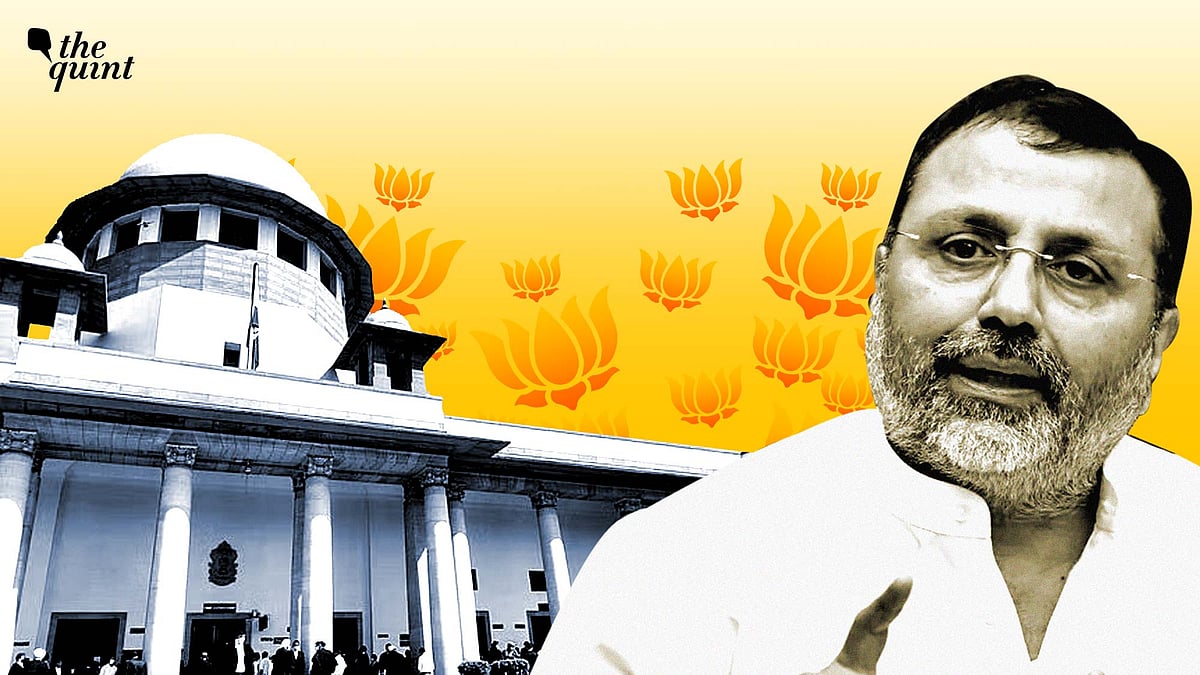
Why BJP Won’t Muzzle Nishikant Dubey Even After His Attacks on the SC
The BJP faces circumstantial charge of being tolerant to loudmouths in the party, writes Manish Anand.

advertisement
In the wake of the Bharatiya Janata Party (BJP) MP Nishikant Dubey's controversial post on X, questioning whether the Parliament should be shut down if the Supreme Court is to make laws, the party president JP Nadda distanced himself from the remark.
But, despite Nadda’s disassociation with Dubey's comments, the post remains undeleted on his timeline.
In a video statement to news agency ANI, Dubey went further, declaring that “Chief Justice Sanjiv Khanna is responsible for all the civil wars happening in this country.” This video, too, remains live on his X account.
A day later, Dubey doubled down. He accused former Chief Election Commissioner SY Qureshi of having been a “Muslim commissioner."
This lack of restraint leaves one wondering if the BJP president lacks power to discipline his party MP. Or does the party, despite its formal disavowal, tolerate such vile remarks from party MPs? Another reading could be that the BJP may simply wish to steer clear of legal tangles. Dubey’s comments risk falling under the ambit of defamation—not just against individuals, but against the institution of the Supreme Court and the Chief Justice of India.
Dubey Bolts Parliament Perimeter to Pitch Saffron Image
Nishikant Dubey is a four-time Lok Sabha MP from the Godda constituency in Jharkhand, winning consistently since 2009.
For his first three terms, Dubey mostly confined to his parliamentary role. He appeared to be a backbencher in the Lok Sabha, but was always one of the loudest voices disrupting the speeches of Opposition leaders.
In his third term, Dubey emerged as a disrupter of the Standing Committee on IT, which was then chaired by Congress MP Shashi Tharoor. He disrupted sessions with the CEOs of social media platforms and built a campaign against Tharoor by mobilising fellow BJP MPs to lodge complaint against him with the Lok Sabha speaker.
Dubey now chairs the same Standing Committee.
His new identity is grounded in Hindutva rhetoric. In Jharkhand, he began to aggressively amplify claims of ‘land jihad’—a strategy the BJP adopted in its recent state Assembly campaign, alongside ‘love Jihad’.
BJP’s Saffron Somersault
In recent years, the BJP has assessed that welfarism may not help always help them win elections and therefore has been blessing leaders like Dubey to play the Hindutva card.
Dubey isn’t alone. In September 2023, the then South Delhi MP Ramesh Bidhuri had rained expletives on Bahujan Samaj Party (BSP) MP Danish Ali. The video clips went viral, but the BJP didn’t take any action against Bidhuri.
Instead, Bidhuri was rewarded with a campaign assignment in the Rajasthan Assembly elections. He contested the Delhi Assembly elections this year against former chief minister Atishi—and again resorted to sexist barbs, this time aimed at Congress leader Priyanka Gandhi Vadra. Still, no censure from the BJP.
The BJP, thus, faces circumstantial charge of being tolerant to loudmouths in the party who can get away by saying anything against anyone.
Dubey Joins Army of Narrative Makers
The BJP’s principal challenge comes from the politics of caste and regional identities in Uttar Pradesh, Bihar, Jharkhand, Maharashtra, and many other states. But the politics of polarisation makes the task of the BJP winning elections easier. Hindu-Muslim politics, as per BJP leaders, overwhelms caste identities.
Dubey’s post on X stating that “If the Supreme Court has to make laws, then the Parliament should be shut down” has 1.7 million views.
The constituency that consumes ‘Hindu-Muslim’ political fodder remains deeply engaged on these platforms. This also enables the BJP’s support base to look away from dissatisfaction with the government—both at the Centre, and in the states.
An army of YouTubers and reel-makers further mine the audience partaking in the ‘Hindu-Muslim’ discourse. Dubey and his tribe within the BJP have to constantly feed this audience with fresh salvos to whet their communal appetites.
Is BJP Worrying Advent of Judicial Activism?
Importantly, the BJP is wary of judicial activism. The BJP was stunned with the Supreme Court's verdict on Tamil Nadu bills and also appears visibly uncomfortable with the Chief Justice of India's scrutiny of amendments to the Waqf Board Act, particularly around ‘Waqf by user’ and the inclusion of non-Muslims on the board.
Unrestrained attacks by Dubey and his ilk—and their amplification on television and social media—are being seen by observers as nervous reactions to the judiciary’s serious checks on laws introduced by the Narendra Modi-led government.
Whether this is part of a broader attempt to pressure the judiciary is a question only the courts, with their eagle-eyed vigilance, can ultimately determine.
(The author is a Delhi-based political journalist, who for over two decades worked for The New Indian Express, Deccan Chronicle, The Asian Age, and The Statesman. This is an opinion piece and the views expressed above are the author’s own. The Quint neither endorses nor is responsible for the same.)
- Access to all paywalled content on site
- Ad-free experience across The Quint
- Early previews of our Special Projects
Published: undefined